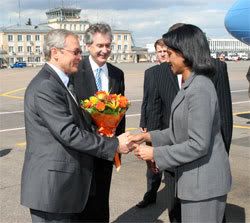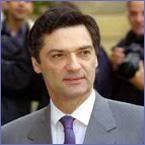From Washington, in Brief
By Emil Sanamyan
Congressional friends, advocacy groups note linkage between Armenian election and strengthened ties with U.S.
In a May 18 message to Armenian leaders, co-chairs of the Congressional Caucus on Armenian Issues, Reps. Frank Pallone (D-N.J.) and Joe Knollenberg (R-Mich.) welcomed the successful conduct of the May 12 parliamentary election. The vote was previously praised by international organizations, U.S. and European officials.
The co-chairs noted in their message that “the importance of this round of elections was well-understood and carried out honorably by your government.” In his May 21 speech on the congressional floor, Rep. Pallone further noted that the election “will most certainly enhance and deepen U.S.-Armenia relations, while also elevating Armenia's reputation regionally and internationally.”
The congressman also urged continued robust U.S. assistance to Armenia and noted that the improved electoral conduct “also addresses concerns expressed by the Millennium Challenge Corporation [MCC]” and that the “MCC [should] fully fund its compact with Armenia in an expeditious manner.”
Last year, the U.S. and Armenia concluded a five-year agreement on the provision of $235 million in U.S. assistance -- conditional on Armenia’s improved handling of elections.
The international praise for the election was also welcomed by the Armenian Assembly, the Armenian National Committee, and the U.S.-Armenia Political Action Committee. In a May 18 letter to the MCC’s CEO Ambassador John Danilovich, USAPAC’s Executive Director Ross Vartian stressed that MCC’s performance-based assistance program offered Armenia a “powerful incentive for meeting the goal of substantially improved elections” and expressed hoped that the “MCC Board will also be encouraged by Armenia’s substantial electoral improvement.”
U.S. steps up pressure on Iran amid international criticism of its nuclear program
In an open show of force, nine U.S. Navy vessels, including two aircraft carriers, carrying 17,000 military personnel, sailed through the Persian Gulf on May 23, international news agencies reported. President George W. Bush has not ruled out using military force to prevent Iran, Armenia’s southern neighbor, from acquiring nuclear weapons.
The move came as the International Atomic Energy Agency (IAEA) issued a report criticizing Iran for failing to halt its nuclear program. Also this week France’s new President Nicolas Sarkozy added to the U.S.-led international pressure, calling a nuclear-armed Iran “unacceptable,” the Economist reported.
But the news magazine added that “despite the show of force and the reports of the IAEA [that may lead to tougher international sanctions], there is little sign that Iran is ready to back down.”
On May 22, ABC News cited current and former officials as saying that President Bush authorized “non-lethal” covert action against Iran that includes propaganda and disinformation through the media and efforts to undermine the Iranian economy through currency manipulation. Similar revelations, as well as claims of more lethal U.S. efforts, were made months ago in The New Yorker magazine.
Tehran has long suspected that U.S. support extends to irredentist groups that have conducted deadly terrorist attacks within Iran; the clerical regime recently intensified its crackdown on individuals it suspects of ties to the U.S. government.
But recently retired senior U.S. intelligence official Bruce Riedel told ABC News that the administration has so far concluded that “a military strike has more downsides than upsides."
Washington ponders relations with Russia
 On May 15, U.S. Secretary of State Condoleezza Rice arrived in Moscow in an apparent effort to mend existing tensions, just as the U.S. seeks international support against Iran.
On May 15, U.S. Secretary of State Condoleezza Rice arrived in Moscow in an apparent effort to mend existing tensions, just as the U.S. seeks international support against Iran.The list of disagreements is long and includes the future status of Kosovo (Russia opposes its independence), the future of the Ukraine and Georgia (Russia opposes their pro-Western orientation), U.S. criticism of Russia’s domestic policies, as well as U.S. plans to deploy missile defenses in central Europe and to undermine Russia’s dominance in European energy markets.
Mediamax news agency reported that Assistant Secretary of State Dan Fried,who accompanied Rice on the trip, talked about “conflicts in the South Caucasus” with a Russian deputy foreign minister, with no details reported. Joint U.S.-Russian efforts (which also include France) to manage the Karabakh conflict are frequently mentioned as a bright spot on the mostly contentious bilateral agenda.
But larger issues continue to cloud the horizon. The House Foreign Affairs Committee chair Tom Lantos (D-Calif.) said in a statement for the May 17 hearing that he spoke with Secretary Rice after she left Moscow and that “she was not very optimistic.” In a throwback to Cold War days, that hearing was titled “Russia: Rebuilding the Iron Curtain,” and focused on Russia’s democratic shortfalls.
General pessimism about the relationship also dominated the World Russian Forum 2007 held at the U.S. Congress. The conference was primarily sponsored by LUKOil -- the largest Russian company doing business in the U.S. -- and drew prominent experts who focus on the two countries’ relations.
One of the organizers, Edward Lozansky, president of the American University in Moscow, complained that many invited members of Congress shunned the event. Two congressmen who did speak were the chair of the U.S. Helsinki Commission Alcee Hastings (D-Fla.) and presidential hopeful Dennis Kucinich (D-Ohio).
One of the Moscow experts speaking was Prof. Andranik Migranyan (an informal Kremlin advisor), who began with a personal note that “after Moscow and Yerevan, he loves Washington more than any other city.” But then Mr. Migranyan launched into criticism of a Washington that “loves” dealing with weaker states and wants a Russia that it could order around.
“But [Russia is] not a defeated nation like Germany or Japan” after World War II, Mr. Migranyan said, arguing that it would not follow the U.S. lead in a similar manner. He described the current relations not as “cold war,” but as a natural competition for power and influence, and only some ad-hoc cooperation.
French cabinet formed: Devedjian to lead ruling party
 On May 17, veteran French Parliament member and former cabinet minister Patrick Devedjian was appointed secretary-general of the ruling center-right Union for Popular Movement, news agencies reported. The post was previously held by President Sarkozy.
On May 17, veteran French Parliament member and former cabinet minister Patrick Devedjian was appointed secretary-general of the ruling center-right Union for Popular Movement, news agencies reported. The post was previously held by President Sarkozy.This column previously referred (in the Reporter's May 12 edition) to Turkish concerns that the 62-year-old Devedjian might be appointed Foreign Minister. That post went instead to the former senior Socialist Party member Bernard Kouchner, who supported removing Iraq’s Saddam Hussein from power. President Sarkozy also appointed current Ambassador to the U.S. Jean-David Levitte to head a newly created National Security Council, and economist Jean-Pierre Jouyet as minister for the European Union (EU).
These appointed officials are viewed as proponents of closer U.S.-French relations, as well as being relatively more amenable to Turkey. On May 22, Agence France Presse quoted Mr. Jouyet as reiterating President Sarkozy’s pre-election opposition to full EU membership for Turkey, while supporting a “special partnership” with Ankara, in part through a proposed “Mediterranean Union” that would also comprise some of the countries of the Near East and North Africa.
In the meantime, the Economist reported on May 9 that during the April 24 Armenian Genocide commemoration, Paris Mayor Bertrand Delanoë proposed to name one of the city’s streets after Turkish-Armenian journalist Hrant Dink, assassinated last January. The news magazine cited official estimates that French “citizens of Armenian descent in the Paris region number between 150,000 and 180,000.”
Azerbaijan’s media crackdown intensifies, with regime’s critics cast as “Armenian agents”
The U.S. Embassy in Azerbaijan and the Organization for Security and Cooperation in Europe (OSCE) have criticized the Azeri government’s decision to force a closure of the Realny Azerbaijan newspaper on May 20, local agencies reported.
The move came as the newspaper’s editor Eynullah Fatullayev -- already imprisoned for allegedly diverging from the government’s narrative of the Karabakh conflict (see the Reporter's April 28 edition) -- is facing new charges of “terrorism” and, according to the Regnum news agency, the Azeri government sought to implicate him in “cooperating with Armenian special services.”
Fatullayev is known for his investigative reporting exposing government corruption. He came under increased pressure after visiting Karabakh in early 2005, a trip Azerbaijani officials denounced as “treasonous.” An article written last month based on that trip resulted in Fatullayev’s being sentenced to two and a-half years in prison. He now faces a potentially longer prison term.
The U.S. Embassy statement described Realny Azerbaijan – the largest circulation periodical in Azerbaijan -- as a “very important newspaper,” and urged the government to allow it to publish. OSCE’s media freedom envoy Miklos Haraszti, who also criticized the crackdown, noted that Azerbaijan now has seven journalists in prison, more than any other OSCE member state.
Earlier this month, the New York-based Committee to Protect Journalists (CPJ) identified Azerbaijan as one of 10 countries worldwide where media freedoms have deteriorated the most. But President Ilham Aliyev’s aide Ali Hassanov dismissed the finding, alleging that CPJ is “working under the influence of the Armenian lobby,” Day.az reported on May 7.

No comments:
Post a Comment